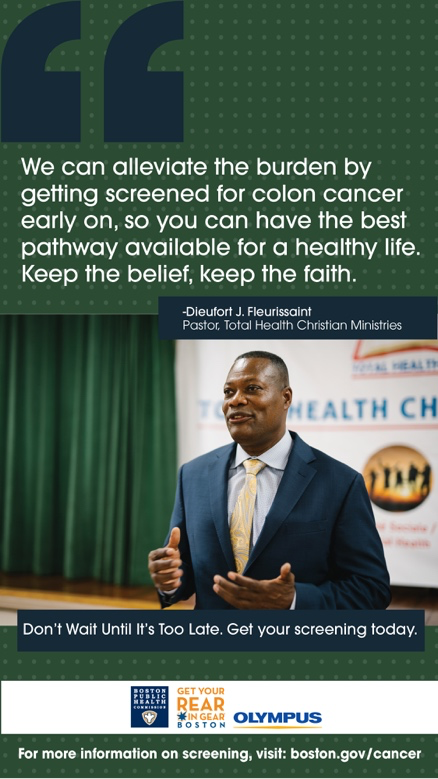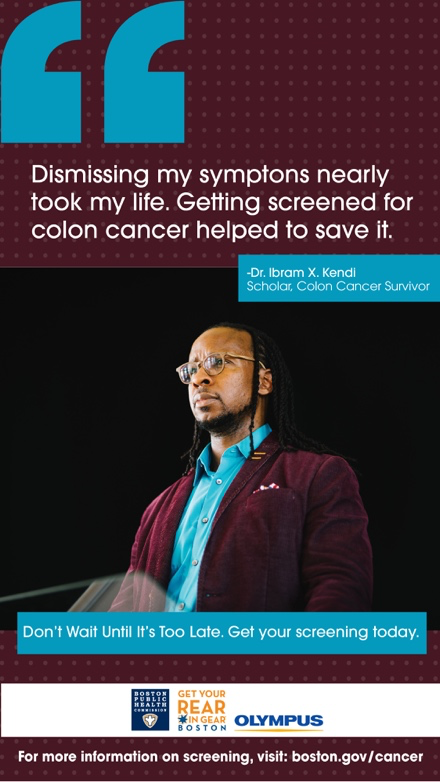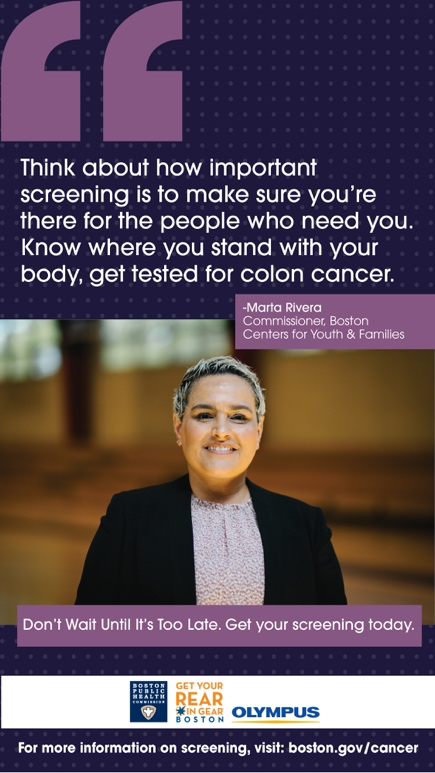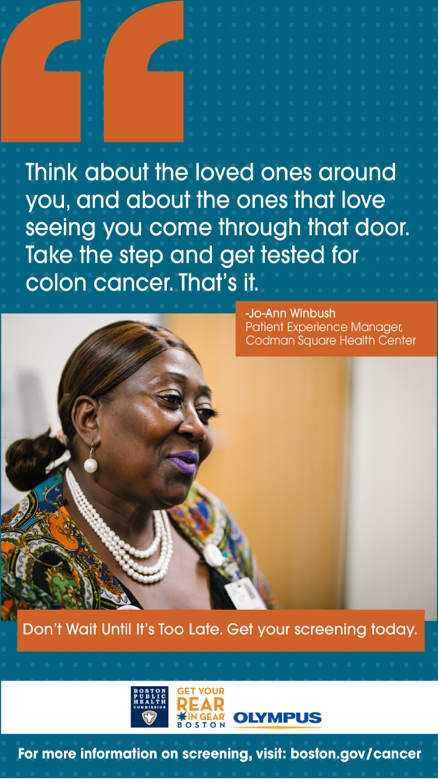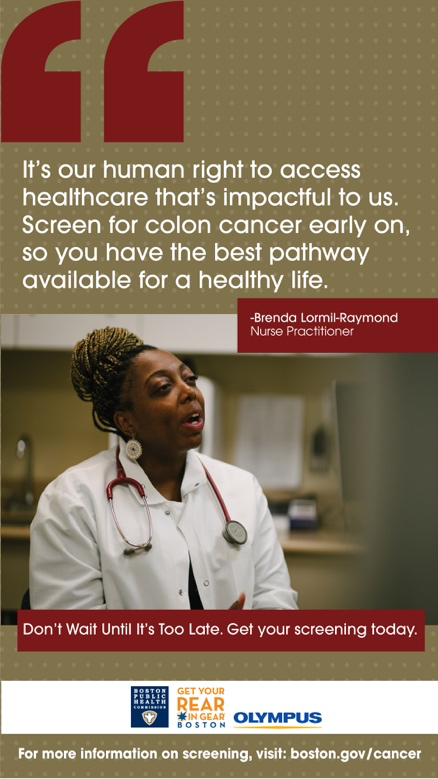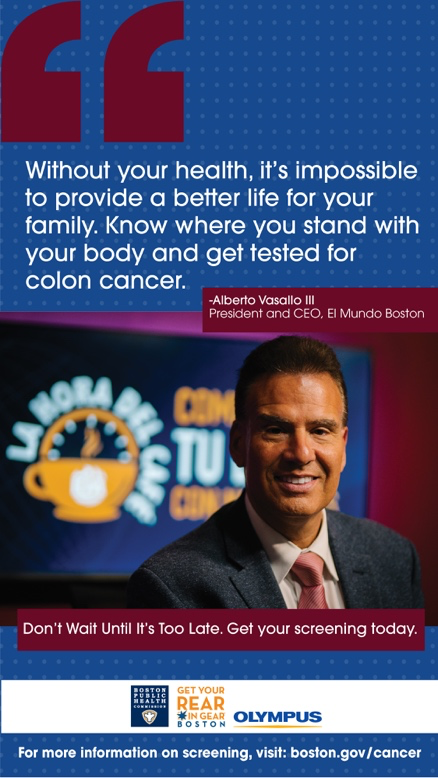Cancer Early Detection and Survivorship
The Chronic Disease Prevention and Control division addresses inequities in cancer outcomes for Boston residents.
Cancer is the leading cause of death in Boston. The cancers we focus on are: breast, cervical, colorectal, lung, prostate, and skin cancer. You can find more information on each of these cancers below.
Early detection saves lives. You can make cancer screening part of your routine. Call your primary health care provider to schedule your cancer screenings. If you don’t have a primary health care provider, call your health insurance to be matched with a provider. If you don’t have health insurance, call the Mayor’s Health Line at 617-534-5050 for help signing up for insurance. If you need additional resources, visit 211 Help Steps.
Colon Cancer Awareness
Our goal is to increase screening for Colon Cancer.
Screening for Colon Cancer can save lives. Colon cancer screenings can prevent the cancer from starting or may catch the cancer at an early stage. The best way to survive cancer is to catch it early.
Learn more about colon cancer, your risk, and when to start screening by reading below.
Colon Cancer

Am I at Risk for Colon Cancer?
The colon is where digested food goes so you can have a bowel movement, which goes through the rectum. Colorectal cancer is a disease in which cells in the colon or rectum grow out of control. It is often called colon cancer for short.
You may be more likely to develop Colon Cancer if you:
- Have a genetic condition or a family history of colon cancer
- Are Black, American Indian, and Alaskan Native. These racial groups get colon cancer more than other racial groups

How do I Screen for Colon Cancer?
There are multiple types of screenings for colorectal cancer. The two most common are:
- Stool Test: Also called FIT or FIT-DNA. This is done in coordination with your provider either at home or in-office.
- Colonoscopy: This test is typically done by a specialist in a clinic, who uses a tube to look for polyps or cancer inside the rectum or the entire colon.
A stool test is less invasive and more accessible than a colonoscopy. Always talk with your healthcare provider to determine the best screening option for you.

When Should I Start Screening?
Always start by talking with your healthcare provider.
- If you have a genetic condition or family history of colorectal cancer, talk with your healthcare provider about when to start screening and how often you should screen.
- If you are 45 years or older and not at high risk, get a FIT test every year or a FIT-DNA test every 3 years and follow up with your provider about the next steps. If you choose to get a colonoscopy, the frequency of the screening will depend on what was found during the procedure.
- Screening is not recommended for individuals 75 years and older unless directed by your healthcare provider.
For more information, visit the CDC's Colorectal Cancer website and the Colon Cancer Coalition.
Breast Cancer
Breast Cancer
Am I at Risk for Breast Cancer?
Breast cancer is a disease in which cells in the breast grow out of control. There are different kinds of breast cancer.
You may be more likely to develop breast cancer if you:
- Have a family history of breast cancer
- Are Black, Asian, American Indian, and Alaskan Native. Women from these racial groups are at higher risk of breast cancer compared to white women

How do I Screen for Breast Cancer?
Breast Cancer is screened with a mammogram.
- A mammogram is a low-dose (amount) x-ray that allows doctors to look for changes in breast tissue
- It uses a machine that takes x-rays of breast tissue. The machine takes x-rays at lower doses of radiation than usual x-rays

When Should I Start Screening?
Always start by talking with your healthcare provider. Women should get a mammogram depending on their age and risk factors. If you are…
- Under 40: Talk to your provider if you would like to be screened or if you have a family history of breast cancer
- 40-49 years old: Get a mammogram every 2 years if you have a family history of breast cancer. Talk with your healthcare provider and decide when to start screenings
- 50-74 years old: Get a mammogram every 2 years
- 75 years and older: Discuss the need for further screenings with your provider
For more information, visit the CDC's Breast Cancer website.
Cervical Cancer
Cervical Cancer
Am I at Risk for Cervical Cancer?
The cervix connects the vagina (birth canal) to the upper part of the uterus. The uterus (or womb) is where a baby grows when during pregnancy. When cancer starts in the cervix, it is called cervical cancer.
You may be more likely to develop cervical cancer if you:
- Are sexually active
- Have been infected with HPV
- Have a history of cervical issues or other sexually transmitted diseases
- Are Black, LatinX, American Indian, Alaskan Native, or Asian. Women from these racial groups are at higher risk of cervical cancer compared to white women

How do I Screen for Cervical Cancer?
A Pap test, also called a Pap smear, is done at your healthcare provider’s office.
- During this exam, you lie on an exam table with your feet placed firmly in stirrups
- Your provider inserts a metal or plastic tool (speculum) into your vagina to see the cervix
- A sample of cells from your cervix is collected using a special brush. These cells are sent to a lab for testing

When Should I get Screened?
Always start by talking with your healthcare provider.
- Screening tests and the HPV vaccine can help prevent cervical cancer
- You should get a Pap test if you are a woman between 21 and 65 years old. Screening frequency depends on your age and which screening test you get
For more information, visit the CDC’s Cervical Cancer website.
Lung Cancer
Lung Cancer
Am I at Risk for Lung Cancer?
When cancer starts in the lungs, it is called lung cancer.
You may be more likely to develop lung cancer if you:
- Currently or previously smoked tobacco products
- Have been exposed to chemicals such as radon, asbestos, and diesel fumes
- Have a history of certain cancers
- Have a family history of lung cancer
- Have a history of COPD or pulmonary fibrosis
- Are Black, Alaskan Native, and American Indian. These racial groups get lung cancer more than other races

How do I Screen for Lung Cancer?
A low-dose CT (LDCT) is used to screen lung cancer.
- During an LDCT scan, an X-ray machine takes detailed images of your lungs
- The scan only takes a few minutes and is not painful

When Should I get Screened?
Always start by talking with your healthcare provider. If you are 50-80 years old and have smoked, talk with your healthcare provider about getting screened for lung cancer and when to start. Testing is done yearly.
For more information, visit the CDC’s Lung Cancer website.
Prostate Cancer
Prostate Cancer
Am I at Risk for Prostate Cancer?
The prostate is a part of the male reproductive system. It is located just below the bladder and in front of the rectum. It is about the size of a walnut and surrounds the urethra (the tube that empties urine from the bladder). It produces fluid that makes up a part of semen. When cancer starts in the prostate, it is called prostate cancer.
You may be more likely to develop prostate cancer if you:
- Are Black. Black men are more likely to get prostate cancer than any other racial group.
- Have a family history of prostate cancer
- Are 40+ years old

How do I Screen for Prostate Cancer?
The primary test for prostate cancer is a PSA test.
- PSA is a blood test. It measures the level of a substance (PSA) made by the prostate in the blood. During this test, a small amount of blood is taken from your inner elbow by a specialist
If your healthcare provider sees a rise in PSA levels, a Digital Rectal Exam may be done to determine if the prostate is enlarged or if there is a firm spot to determine if a biopsy is needed.

When Should I get Screened?
Start by talking with your healthcare provider about prostate cancer screening if you are:
- 40 years old and are Black or have a family history of prostate cancer
- 55-69 years old
After deciding with your healthcare provider if screening is right for you, get a PSA test every 2 years, or on a schedule recommended by your provider following your test.
For more information, visit the CDC’S Prostate Cancer website.
Skin Cancer
Skin Cancer
Am I at Risk for Skin Cancer?
When cancer starts in the skin, it is called skin cancer. Skin cancer is the most common cancer in the United States.
You may be more likely to develop skin cancer if you:
- Are 65 or older
- Have fair skin
- Have chronic exposure to the sun regardless of skin type (chronic sunburns)
- Have sun sensitivity
- Have a large number of moles (more than 100)
- Have a family history of skin cancer

How do I Screen for Skin Cancer?
A total body skin examination (TBSE) is a visual examination of the skin that can be done by your regular doctor and followed up by a dermatologist.
- The screening checks moles, birthmarks, or other marks that are unusual or have changed
- Certain unusual marks or changes may be signs of skin cancer

When Should I get Screened?
If you have any of the risk factors noted above, talk to your provider about getting screened for skin cancer.
You can also complete a self-screening. If you have any concerns after completing the self-screening, talk to your provider. To do a head-to-toe screening of your skin:
- Be in a well-lit room in front of a full-length mirror
- Have a hand mirror to check areas that are hard to see
- Check all areas of your body including behind your legs, under your feet and on your scalp
- Check moles for signs of melanoma by using the following criteria:
- Asymmetry: The mole has an odd shape, with half of it not matching the other half
- Border: The border of the mole is ragged or irregular
- Color: The color of the mole is uneven
- Diameter: The mole is bigger than the size of a pea or a pencil eraser
- Evolving: The mole has changed in size, shape, or color
For more information, visit the CDC’s Skin Cancer website.
Local Cancer Resources
Local Cancer Resources| Resource | About |
|---|---|
| Coils to Locs |
Supplier of coily, curly wigs for Black women or any woman with textured hair experiencing hair loss due to cancer treatment |
| Ellie Fund |
Provide essential support services for breast cancer patients to ease the stresses of everyday life, allowing the focus to be on family, recovery and healing. |
|
Massachusetts Breast and Cervical Cancer Program, Mass Department of Public Health |
Provides resources to increase breast and cervical cancer screening rates in Massachusetts. For patient resources, click here. |
| The Breast Cancer Personalized Risk Assessment, Education and Prevention (B-PREP) Program at Dana-Farber/Brigham and Women’s Cancer Center | A step-by-step, comprehensive and customizable plan of care created by breast cancer specialists |
| Dana-Farber's Mammography Van | Provides mammograms and breast health education to women 40 years of age and older. View their calendar to find out when the van will be in your area. |
| Mammography Suites and Community Health Centers: Whittier Street, Mattapan Community Health Center | The goal of the Mammography Suite is to connect low-income, elderly, and medically underserved women to high-quality care facilities and providers. |
| Resource | About |
|---|---|
| Massachusetts Breast and Cervical Cancer Program, Massachusetts Department of Public Health | Provides resources to increase breast and cervical cancer screening rates in Massachusetts. For patient resources, click here. |
| Resource | About |
|---|---|
| The National Colorectal Cancer Roundtable | Dedicated to reducing the incidence of and mortality from colorectal cancer in the U.S., through coordinated leadership, strategic planning, and advocacy. |
| Colon Cancer Coalition | Reducing barriers to complete colorectal cancer screening and educating the public to advocate for their own health through tailored, local, grassroots solutions. |
| Young Onset Colorectal Cancer Center, Dana-Farber Cancer Institute | Focuses exclusively on the care of colorectal cancer patients under the age of 50. |
| Resource | About |
|---|---|
| American Lung Cancer Screening Initiative (ALCSI) | Promotes lung cancer screening for people who are at high-risk of developing lung cancer. Visit their website to take a quick and free assessment to determine if you are eligible for lung cancer screening. |
| Lung Cancer Screening Programs at Dana-Farber, MGH, BWH, BIDMVC, BMC, and St. Elizabeth’s Hospital |
The following Boston-Area hospitals provide lung cancer screening programs with a referral from affiated health centers: -Beth Israel Deaconess Medical Center (BIDMC) - Brigham and Women's (BWH) |
| Lung Cancer Foundation of America | Mission is the improvement in survivorship of lung cancer patients through the funding of transformative science. Serves as a resource for patients or anyone seeking answers, hope, and access to updated treatment information, scientific investigation, and clinical trials. |
| Massachusetts Tobacco Cessation and Prevention Program | Statewide public health program focused on comprehensive approaches to reduce tobacco and nicotine use. 1-800-QUIT-NOW is Massachusetts’ Tobacco and Nicotine Quitline. |
| Tobacco Control and Lung Cancer Prevention Program, Whittier Street Community Health Center | Provides individual tobacco treatment counseling to patients of Whittier Street Health Center (WSHC) in Roxbury, MA. |
| Resource | About |
|---|---|
| Massachusetts Prostate Cancer Coalition | Educates, connects, and supports men-at risk, diagnosed individuals, and their caregivers to improve knowledge, reduce prostate cancer healthcare disparities, and improve access to care. |
| The Prostate Health Education Network, Inc. | PHEN's mission is to eliminate the African American prostate cancer disparity, and to increase the overall support and resources. |
Health of Boston: Cancer Report
Read the Health of Boston 2023: The Cancer Report.
The report explores how cancer impacts Boston residents. It identifies certain groups that are more affected than others. It also identifies the role of public health in preventing cancer and improving cancer outcomes. This report aims to provide residents, medical and public health professionals, health policy makers, and community advocates with actionable information on the cancer experience of Boston residents.


